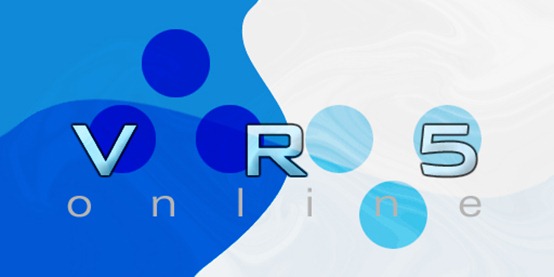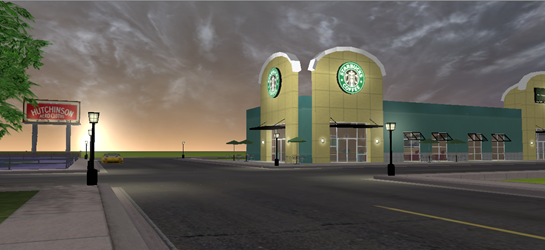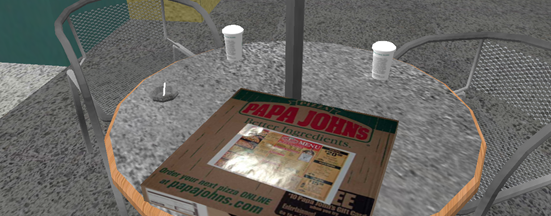When chaos theory applies, only those who seek heretics win out. #SecondLife @Rodvik |
Years ago when I was the CTO of VR5 Online, my boss at the time came to me with an interesting and possibly impossible challenge. At the time, I answered to the CEO of the company who was Mr. Clark, and he was an interesting and sly individual. One of the major purposes of VR5 Online was to explore and research methods in virtual environments while taking extensive notes on the outcomes for future applications. During that time we were engaged with ActiveWorlds as a technology, running our own world called VR5 | City of Nidus for which this blog is originally named (cityofnidus.blogspot.com).
There is a deeper story behind the name City of Nidus, in that the original project was run by @AdamFrisby (who went by the name Gwala). As far as I can remember, it was originally a world owned by ActiveWorlds called Flagg007, named after the AWI employee who provided the world for experimentation – Flagg (the community leader of AW). Now, Gwala at the time was experimenting with different ideas in AW with the Flagg007 world such as ideas for design and lighting, and a little bit of modeling too. There were a handful of people in that project, specifically hand-selected to participate purely for the ability to innovate ideas in a virtual sense. At that time, I remember I was invited to work in Nidus with Gwala and I brought along a friend Wesley Seay (whom to this day I call Capri).
Capri was a name I came up with because when he was a kid (he started using virtual environments when he was around 13 or so) his nickname was Liquid Cool, and my first impression was to say “You mean like Capri Sun drinks?”. Well, the nickname stuck and over the years he just kept it which is in many way how I came to use the Darian Knight nickname – I originally chose Aeonix as a nickname back in 1996 but I became known among my friends in real life for watching way too much Sailor Moon (and to be fair, it was the only thing remotely interesting on television when I was getting ready for school) so I ended up with my nickname being Darian out of habit, versus Aeonix.
This is still related to the post, by the way… it’s just a bit of context and backstory.
But I Digress
When my boss at the time, Mr. Clark, proposed some research at VR5 Online, he came to the conclusion that I should run a virtual world in ActiveWorlds by which he would give me a list of things I had to accomplish and research each year in order to validate another year renewal for that project. That went on for a few years before it was decided to close the project, but in the beginning of it, I was to find the best ways to do certain things on that list.
Now, as a professional you would normally see things in a manner which excludes all of your options. This is your scope and vision, more or less. Some of us have a wider scope than others, while in many cases we become specialized and thus myopic in our scope. There is a place for both types of thinking and scope but we first have to understand that a limited scope and ability can be detrimental to a project or endeavor if we aren’t careful to identify that ahead of time.
I remember one of the points on the list for Nidus was simply to launch a behavioral study and utilize it toward marketing in virtual environments. The “impossible” aspect that he threw in was that I had to do so in a manner in which nobody would ever realize they were being studied, in effect I had to blend it all together as if it was perfectly natural.
What I came up with was pretty ingenious, even to this day.
It was a small town, and it had lots of different stores and aspects. But then on a more minute detail there were other studies and aspects underlying and they all worked together. The important part about this is the team that put it together.
It was a motley crew of individuals, and I’m proud of them to this day – many of them went on to become successful media designers, while others remained rogues and unconventional assets to projects. The most interesting part was that many of them were teenagers, or recent high school graduates who had simply accumulated years of experience in a virtual environment and how to create within them. I intentionally saw the merit of experience versus traditional education and decided that the experience of the individuals far surpassed the qualitative assets they could have brought to the project if they were simply of traditional education. It was a voluntary basis, and its own little community, and those teens ran circles around even ActiveWorlds Inc as a company.
Now, when I say they ran circles around AWI, I’m talking to a point where they put ActiveWorlds to shame as a company with the things they could do versus what the company itself was doing with their own technology. To this day I’m proud of their accomplishments, and I learned quite a lot over those years as to the best manner to work within a virtual environment setting. Years later, the things that were discovered and innovated in VR5 | Nidus continue to shape the direction of ActiveWorlds and even contribute to virtual environments as an industry.
This is what I like to call “Unconventional Conventions” in that the best approach, and the best way to get deeper insight and progress is often times (in virtual environments and elsewhere) to abandon our preconceived notions of scope and ability. I could have put in a budget request to my boss in order to hire a staff related to the project, but I wouldn’t have progressed anything. The band of rogues did things that to this day are extraordinary and pretty amazing, and they did so because they wanted the challenge, and furthermore knew that I was a hard-ass that would push them above and beyond to do better. In the end, they did things that to this day have yet to be replicated in an open ended virtual environment like SecondLife or ActiveWorlds in any official capacity.
Oh, they often hated me when I was telling them they could do better, or when I pointed out flaws. But they learned over time that the best compliment for a job well done is when somebody like me says “This is fantastic!” or when the rest of the community looked up to them as innovators, however much a set of rogues they were. Nothing said that more than when we put together a live concert, not once but twice in ActiveWorlds with the band Aztech Rising.
The first concert pushed the limits of conventional ideas for “events” in ActiveWorlds by introducing the idea that a live concert could be played in a virtual environment on a large scale, while on the second concert a year later we revamped the entire stadium with particle effects and a custom arena, complete with a fireworks show and lasers. The latter concert took it a step further by introducing the idea that a virtual event can be linked to real life merchandise, and as a result, a shop was available at the stadium during the concert to allow the concert goers to get real life swag such as concert t-shirts, hats and more. Remember, this is an innovation that came out of the minds of wild card prosumers and not traditional education.
Later on in places like SecondLife, we take these sorts of ideas for granted. We have events and giveaways, and there are plenty of live performers on a nightly basis. But in those early days, this was totally unconventional, let alone the idea of selling real life merchandise in conjunction with a virtual concert. In an unofficial capacity, this idea continued to blossom, but in a conventional and official capacity that is Linden Lab themselves, the idea has yet to catch on. If anything, the wild cards are still innovating despite Linden Lab constantly trying to put on the brakes.
Full footage of the first concert can be watched here on the Aztech Rising archive.
The idea here is that even to this day, the rule of unconventional conventions continues to work with the same brilliant results as they did in the late 1990s and through to 2007 when Nidus reached its end goal and shut down.
Recently with IEEE Virtual World Standards there has been an ongoing project among the group to create demonstrations for the public in order to show the ideas of interoperability. The original idea for this demonstration was to build a multi-universe game of PONG where you’d hit a ball in maybe SecondLife and have it go down the play area, and at the halfway point, disappear and show up in say, ActiveWorlds for instance to be hit back to SecondLife.
Now, the people in IEEE Virtual World Standards are some extremely talented and brilliant men and women. However the case may be, I still had an inkling ahead of time that a game of PONG between multiple virtual universes may be entirely outside of their scope. Initially, it should come as no surprise that I asked Jon Bee to contribute on my team in the IEEE group to make this happen, after all he was also one of the people in Nidus and even today he contributes in Andromeda Media Group. I knew this man would be the unconventional convention that was needed.
After a number of weeks (maybe a month or two) the group wholly decided it really was outside of their ability to create a PONG game across universes, but luckily for myself and Jon, neither of us attended that meeting to hear a collective defeat. Instead, on a random day the following week, he spent a few hours doing what some of the brightest men and women in virtual environments just recently washed their hands of out of frustration. In a few hours, Jon Bee, the rogue aspect to the high professional aspects of the group, sped through and had a working demonstration of PONG, and later that night he began the link-up between SecondLife and ActiveWorlds.
When the early demonstration was given to Tom Starai to show the initial stride in progress, I remember that he was impressed but also assumed that such a stride in progress must have taken a lot more time to accomplish than it did. In his scope of understanding, and based on the efforts prior by the rest of the group, he was under the impression that such an advancement must have interfered with real life endeavors and projects over a longer period that the rest of the group simply could not afford to give attention to, but in the scope of Jon Bee and our unconventional conventions approach what seemed like it should take a few weeks of constant work actually took a few hours in one night.
By choosing an unconventional convention, or wild card, the promise of an inter-universe game of PONG was given life in a short amount of time, thus advancing the group as a whole forward where they previously had given up on the idea.
Why is this unconventional convention idea so important? Well, by widening the scope and being willing to look for unconventional solutions and people who may not fit our preconceived notions to solve our problems, we often find a wealth of untapped talent and insight. What would seem like an insurmountable challenge becomes trivial, and often with wildly successful outcomes.
We find determination, drive and persistence but most of all we find people who aren’t blinded by preconceived notions, training or scope. This is crucial, and ultimately so when we deal with virtual environments like SecondLife or ActiveWorlds.
Unconventional SecondLife
The reason I’m writing all of this is to lead up to a current conversation I had with one of the Phoenix Team developers recently about why what Linden Lab has been doing all these years actually makes perfect sense when you understand the limited scope of operations they are restricted to.
For instance, it seemingly makes no sense to fire Philip Rosedale and replace him with Mark Kingdon, only to fire Mark Kingdon and put Philip back in place, only to replace Philip again with Rod Humble. All of the interim maneuvers that Linden Lab has taken during this constant changeup seems like a company without a clear understanding of virtual environments, and this is ultimately true but for reasons many don’t realize.
For instance, Philip Rosedale was more of a visionary than a business leader. He had the charisma and cult of personality aspect down pat, but in business he likely did not speak the same language as those which Linden Lab are indebted to. He looked at things in a manner which would say “This is good for people” but likely had little to say in describing how it was good for the bottom line or how a long tail approach would balance the scales of business versus community.
In that frustration, and lack of communication, we saw the introduction of Mark Kingdon who is arguably of a high business pedigree – and his scope for business was shown immediately as he began to shift Linden Lab away from a community aspect and into an Enterprise aspect. I don’t fault Mark Kingdon, because he was merely working within the constraints of his scope, and he really didn’t know the intricacies of a virtual environment ecosystem, nowhere near as well as Philip Rosedale.
The problem was that Philip spoke as a visionary but not as a business person. Mark Kingdon spoke as a business person but not as a visionary. When Mark took a lateral step aside and Philip resumed where he left off, we had a visionary at the helm again – but those who Linden Lab are indebted to wanted faster ROI and expansion, even if that meant cannibalizing the ecosystem to make it happen. Philip likely had a crisis of conscience which led him to leave again, being replaced by Rod Humble, who speaks the business of Video Games.
Rod is the closest we get to a hybrid of business and visionary, but there is still a lack of ecosystem understanding, and that is very dangerous for Linden Lab in the long run. His scope is video games, and while video games are close to what virtual environments like Second Life are, it isn’t a good enough match to apply the same methodologies, because ultimately the things that work for a video game scope will backfire if applied to a virtual environment scope like Second Life.
Subtractive Value
An excellent example is the recent announcement of the new benefits for Premium membership in SecondLife where you get a free “exclusive” gift and access to Premium Sandboxes to build in. The problem is that the “exclusive” gifts have no added value when free users have access to a plethora of content from the community both free and paid for, and likely those in a free membership would have half a dozen similar sets in their inventory by the time they decided to upgrade to Premium.
The other issue is the Sandboxes because this is yet another indication that @Rodvik and those in the marketing group are clearly outside of their scope of understanding. One of the reasons people upgrade to Premium accounts is for the ability to purchase land of their own, which immediately negates the usefulness of a Premium Sandbox. Even as a free user, the private sandbox idea is all but a moot offering in that even free users can rent land, and that again negates the private sandbox idea if even free users can rent their own land, effectively eliminating most of the need for a sandbox up front.
The same issue applies to giving Premium Members their own premade “Linden Homes”, in that whatever Linden Lab is offering in that aspect is a pale shadow to what a free or premium user could get on their own. Prefab houses and skyboxes are plentiful on Marketplace, making the selection that Linden Lab offers for Linden Homes look like a joke to the community.
Again, if the major added value to a Premium membership is the ability to purchase and sell land, then Linden Homes become a moot offering. Even as a free member you can rent more land and have more options than Linden Lab gives you as an added incentive to become a Premium user. What makes this worse is that leveraging access to legitimate support as a Premium user “added value” tells each and every new user with a free account that you simply don’t give a toss about them, and the last time I checked, that’s a horrendous first impression to be making.
So we have Linden Homes being an attempt at relevancy in the already existing homes, land and accessories markets maintained by the userbase ecosystem of prosumers. Sandboxes that miss the underlying understanding that Premium accounts can buy and sell land, making premium sandboxes an error in judgment. Even free users can rent land, and nearly eliminate the need to use sandboxes. Giving “exclusive” gifts is also a moot point since nobody really cares about an exclusive furniture set when they have a mountain of options otherwise, free user or premium.
More importantly, however, is that while this does show that their scope is extremely myopic at best, and their understanding is lacking, the worst part about all of this is that these seemingly innocent mistakes in succession have lasting and long term negative effects on the ecosystem that is Second Life. At every step of the way, Linden Lab continually turns in on itself to cannibalize the ecosystem and that’s a very bad thing for not just you and I, but for Linden Lab itself.
What we have here, is failure to communicate.
I don’t mean that @Rodvik isn’t listening to the community. No, he’s doing an excellent job on that front. However, there is a difference between listening to the community and actually knowing how to interpret what you are hearing into actionable outcomes that foster a balance of understanding for the ecosystem that is Second Life.
I do not suspect that even @Rodvik is in a position to be effective at that part, and it’s not a negative thing. Of course it’s not necessarily a positive thing either. What it is, is a lack of proper context in overall fashion of this system.
@Rodvik has a lot of business insight pertaining to video games. He’s not a virtual worlds visionary like Philip was, and he’s surely no Chip Morningstar, F. Randal Farmer, or Jaron Lanier.
However, that’s what is missing from the equation. This is precisely why Linden Lab continues to falter. You need balance… you need a sound business mind who at least partially understands virtual environments running the place, but you also need a visionary to guide that leader.
The visionary, or advisor, shouldn’t be the CEO in this case. No, that job is taken and should be held by somebody who knows business scope. The advisor or visionary position, guides and acts as a mediator between the chaos that is a virtual environment system like Second Life, and the business sense that is traditional thinking and scope. They are the person who can read the tea leaves and explain to the CEO. It’s also the sort of person that is comfortable doing that in reverse as well, as in interpreting the business scope into the ecosystem of the virtual environment.
It’s a complimentary sort of role, and nobody needs to be fired to make that happen.
I could argue that Philip Rosedale holds some sort of advisory position on the board for Linden Lab, but I doubt it’s an active involvement. If anything, it’s simply a courtesy sort of thing and Philip is likely wanting to put SecondLife behind him and concentrate on his other projects, like Coffee & Power.
So what we are left with is the understanding that what is needed to bring balance and healthy expansion back to Second Life is an unconventional convention. There are often times when conventional scopes have little impact, or even negative outcomes when applied, and these are the times when it is prudent to start looking for a rogue to guide you.
When we broaden the scope and start looking at unconventional conventions, we eliminate the artificial narrowing of scope we apply out of preconceived bias, and we find solutions that would normally be outright rejected under conventional means, but suddenly offer wildly successful outcomes as a result.
Just like a rag-tag group of teenagers can run circles around a corporation using their own technology, and how a wild card user can do what some some of the best in technology collectively wash their hands of in defeat, the solution of introducing a wild card into the mix is our unconventional convention for Linden Lab.
You’re not likely to find those wild cards through traditional methods, either. Looking through resumes that dictate traditional education instead of hands-on experience and real-world application will get you people who are classically trained to be blind to the proper solutions. They are trained to think inside the box, so to speak – and there is really nothing wrong with that when in proper context, just like there is nothing wrong with Rodvik, Mark Kingdon, and Philip Rosedale all having a narrow scope which excludes seeing the bigger picture. Those scopes are specialized and have a very important purpose, but without balance – without our wild cards, those narrow scopes change from being an asset to a dangerous destructive force.
The day Linden Lab effectively fills an advisory position with a true wildcard that isn’t traditionally educated, but brings a wealth of insight and hands-on experience with virtual environments (not video games) is the day that you’ll see the balance return, and Linden Lab surge ahead in to a second golden age.
A second life, for Second Life.














0 Comments:
Post a Comment